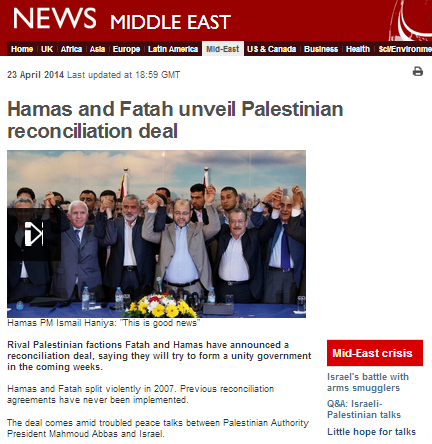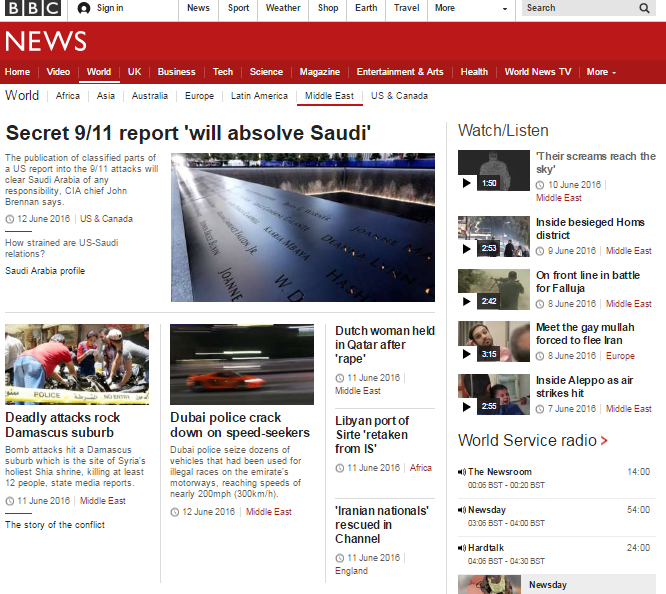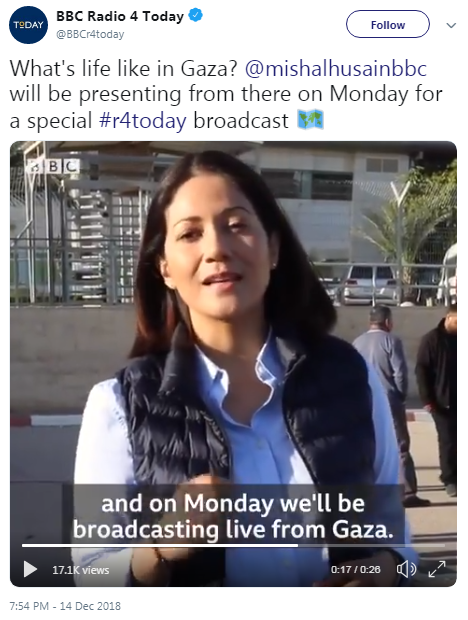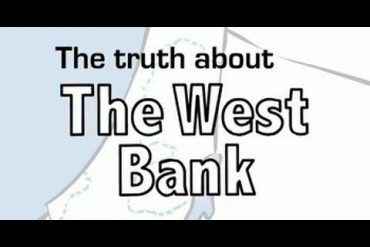BBC News website coverage of the Hamas-Fatah reconciliation deal announced on April 23rd includes two written items and three filmed reports to date.
The main article on the subject initially appeared on April 23rd under the title “Palestinian Hamas-Fatah unity deal announced” but currently goes under the heading “Hamas and Fatah unveil Palestinian reconciliation deal“. Some of the extensive changes made to the report since its initial publication can be viewed here.
As has so often been the case in the past, this BBC report downplays the very relevant subject of the extent of Hamas’ terror designation by informing readers that:
“Israel – along with the US and the EU – views the Islamist Hamas group as a terrorist organisation.”
Canada, Japan and Egypt – which also categorise Hamas as a terrorist organization – are not mentioned. Neither are the United Kingdom, Australia and New Zealand, all of which proscribe Hamas’ Izz al Din al Qassam Brigades.
At the end of the article’s current version readers are told that:
“Shortly after Wednesday’s reconciliation deal was announced, five people were injured in an Israeli air strike in northern Gaza, Palestinian medics said.
Israel said it had targeted militants preparing to fire rockets. On Monday, seven rockets were launched from the territory into southern Israel.”
However, readers of an earlier version of the report were mistakenly led to believe that there was some kind of connection between the air strike and the reconciliation deal when they were merely informed that:
“Shortly after the deal was announced, Israel launched an air strike in northern Gaza that wounded four people. It came two days after Gaza militants launched rockets into southern Israel.”
That wording was later altered to read:
“Shortly after the reconciliation deal was announced, five people were injured in an Israeli air strike in northern Gaza, Palestinian medics said. Witnesses said the target appeared to be two men riding a motorcycle.
It comes two days after militants launched rockets from the coastal territory into Israel.”
The briefly mentioned two day-old incidents of missile fire were not reported by the BBC at the time and in none of the versions of this article is any mention made of the fact that even as BBC journalists were updating and amending this report, a further bout of missile attacks was launched from the Gaza Strip at Israeli civilians.
The article includes quotes from Yolande Knell, with predictably uncritical amplification of the PA party line:
“Ordinary Palestinians have long hoped for an end to the split between their political leaders but previous reconciliation deals in Doha and Cairo were never implemented, says the BBC’s Yolande Knell in Jerusalem.
The agreement will strengthen the position of Mr Abbas – whose Fatah movement dominates the Palestinian Authority, which controls parts of the West Bank – and should also make Hamas feel less isolated as it continues to face border restrictions imposed by Israel and Egypt, our correspondent adds.”
The basis for Knell’s claim that the deal “will strengthen the position of Mr Abbas” is unclear and in fact the exact opposite is no less likely to be the case, both on the domestic front and internationally. Predictably, Knell offers no context to the subject of “border restrictions imposed by Israel and Egypt” or with regard to the connection between Hamas terrorism and those restrictions.
Overall, this report omits the bulk of the background information crucial for audience understanding of the significance of this Hamas-PLO brokered deal. It fails to adequately clarify that there is no evidence to suggest that the supposedly ‘moderate’ Palestinian Authority conditioned Hamas’ entry into a unity government on the renunciation of terror by that organization: a scenario which – according to a recent interview with senior Hamas figure Mahmoud al Zahar – is more than unlikely.
The report also fails to clarify to audiences that beyond an unofficial, unqualified statement by Jibril Rajoub, there is no sign of the PA having insisted on Hamas’ acceptance of the conditions laid down by the Quartet: recognition of Israel, an end to violence and recognition of all previously signed agreements between Israel and the Palestinians. As the Canadian government has already made clear, a Palestinian government which does not accept those basic principles is unlikely to find its position ‘strengthened’, as Knell claims. The issue of the potential addition of Hamas to the PLO and the likely international reaction to that scenario is not explored and the subject of what a Palestinian government which includes an internationally designated terrorist organization could mean in terms of the PA’s status at the UN is also ignored.
In fact, instead of providing audiences with any realistic analysis of the detrimental effects of this move on the latest round of negotiations between Israel and the PLO, the report merely amplifies misleading PA sound-bites, failing to make any attempt to clarify to BBC audiences why this is in fact not just an “internal” Palestinian matter.
“Palestinian officials responded by saying reconciliation was an internal matter and uniting Palestinian people would reinforce peace.
In a statement, Mr Abbas said there was “no incompatibility between reconciliation and the talks” and that they were committed to peace on the basis of a two-state solution.”
In addition to this main report, the BBC News website also promoted an additional article by Yolande Knell in the ‘Features & Analysis’ section of its Middle East page. Dated April 24th and titled “Scepticism over Hamas and Fatah reconciliation deal“, Knell’s piece likewise downplays the extent of Hamas’ terror designation.
“Along with the US and the European Union, Israel views Hamas as a terrorist group.”
That only partially accurate statement is repeated in the caption to a photograph used to illustrate Knell’s article.
“Israel – along with the US and the EU – views the Islamist Hamas group as a terrorist organization”
Whilst liberally garnishing her report with quotes from the ‘man in the coffee shop’, Knell makes no attempt to convey to readers what a deal which brings an intransigent, antisemitic, terrorist organization which denies Israel’s right to exist into the Palestinian government actually signifies with regard to the PA’s commitment to negotiations intended to bring about a peaceful and lasting conclusion to the Palestinian-Israeli conflict. In common with the main report, she uncritically promotes bizarre PA sound bites.
“Palestinian officials retorted that uniting their factions would empower the leadership to make more credible negotiations with Israel and implement any future peace agreement.
In a statement, chief negotiator Saeb Erekat expressed “severe disappointment” at Israel’s response.
“National reconciliation is imperative in order to achieve a just and lasting peace. We hope that we will be able to successfully close this dark chapter of our history,” he said.”
Like the main report, Knell’s article also fails to explore the significance of the fact that the PLO does not appear to have made renunciation of terror and other important factors a condition for the reconciliation deal. Hence, readers are not provided with the necessary background to enable them to judge the following statement made by Knell and the quotes she includes from Israeli officials.
“However Israel’s reaction to the announcement was very negative.”
In fact, one of the few parts of Knell’s article which can realistically be described as analysis is the following:
“However, the Palestinians know they must tread carefully as they determine the details of any unity government.
Most Western governments forbid foreign aid going to Hamas, and the debt-ridden PA – which relies on international donors – will not want to jeopardise its funding.”
The decision to make the subject of scepticism regarding the implementation of this reconciliation deal the focus of this article – without adequate explanation of why similar previous initiatives have failed in the past, what such repeated efforts signify with regard to the Palestinian Authority’s attitude to terror and what message that sends to the Israeli side of the peace negotiations – means that BBC audiences once again remain bereft of vital background information which would properly enable them to “build a global understanding of international issues“.
The BBC’s filmed reports on this topic will be discussed in a later post.





